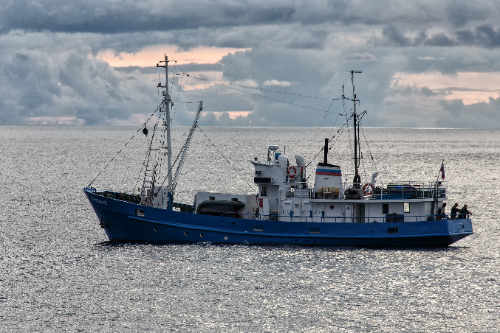
Letter of Acknowledgement from the Ministry of Science and Higher Education of the Russian Federation awarded to Nina Shibanova, Chief IT Specialist at ILLH KarRC RAS
Nikolai Filatov, Principal Researcher of the Northern Water Problems Institute KarRC RAS, a well-known oceanologist, Doctor of Geography, Corresponding Fellow of the Russian Academy of Sciences, Advisor to KarRC RAS Director General, delivered a scientific lecture at the meeting. He is one of Russia's leading specialists in integrated research of inland water bodies and sea coastal waters. In 2021, Nikolai Filatov was honored with F. Litke Gold Medal for his research on climate change impact on large lakes and seas of North Eurasia.
At the Learned Council meeting, Nikolai Filatov summarized the results of 50 years of research in the hydrodynamics of inland waters, hydrology of water bodies, climate change and human impacts on water bodies. Special attention was given to practical issues of drinking water supply to the population.
The scientist's research endeavors have been and still are of practical use. He contributed to finding solutions to the problems of preserving the resources of lakes Ladoga and Onego through involvement at the stage of hydraulic engineering - diversion head works and spillways, in designing the dam - facilities in the Gulf of Finland that protect St. Petersburg from floods. The results of the scientist's work have been used far beyond Northwest Russia: e.g., in dealing with the problems caused by the sharp decline in the level of Lake Sevan in Armenia and the Caspian Sea. As for the latter, there were plans to transfer water from the White Sea to the Caspian Sea, including via Lake Onego. However, scientists proved that such a solution would affect the water bodies. Today, the results of NWPI KarRC RAS studies are essential when determining permissible anthropogenic load on lakes.

Corresponding Academician Nikolai Filatov
The scientist was directly involved in the development of support systems for decision-making on the use of water resources, water quality preservation and restoration, integrated ecological and socio-economic studies of water bodies and catchments, which are important for intensifying resource development in the Russian Arctic zone.
Nikolai Filatov is the author of more than 600 scientific papers. They are based on the data collected through in situ experiments on various lakes, storage reservoirs, seas and the ocean using contact and remote sensing methods, as well as mathematical modeling. The catalogs, reference books, atlases prepared under the scientist's supervision are in demand not only in the scientific community, but also among a wide readership. One such book is the first Atlas of Karelia.
The scientist has always used the latest techniques: he was among the first in Russian geography to use GIS techniques and aerial and satellite remote sensing tools. The researcher is a proponent of innovative approaches, including application of AI theory methods, systems analysis of complex ecological-socio-economic processes in reservoir- catchment systems with the development of cognitive models and finite automata.
Nikolai Filatov is about to present the results of his half-century scientific work in a new monograph to be out this spring. It will be useful and interesting not only for scientists and decision-makers dealing with the use of lake and sea resources, but also for anyone curious about lakes and seas, geography and science in general.

Natalya Belkina, Head of Bottom Sediment Research Group at NWPI KarRC RAS, giving a talk
A novelty of this Learned Council meeting was the discussion of the research themes proposed to be implemented under state assignment in 2026. The first to present their themes to the peers were specialists of the Northern Water Problems Institute - Natalia Belkina, Head of the Bottom Sediment Research Group, and Alexey Tolstikov, Head of the Geography and Hydrology Laboratory. Their new plans are to continue the integrated study of Lake Onego and the White Sea, including with the use of an interdisciplinary approach. Alexander Kryshen, Director of the Forest Research Institute, also presented a new research theme, addressing boreal forest productivity and biodiversity. The participants of the meeting asked the speakers clarifying questions and shared their comments, suggestions and recommendations. The CEOs may use the results of the discussion to refine the themes before their official approval by the Russian Academy of Sciences and the Ministry of Science and Higher Education.
Wrapping up the meeting, KarRC RAS Director General, Corresponding Academician Olga Bakhmet emphasized the importance of applied research alongside basic research tasks.
– Applied tasks are to be specified absolutely clearly, not hypothetically. When we speak of practical significance, it should be of a national scale on the one hand, and the needs and concerns of the residents of our city and our region must be kept in mind on the other hand. Let us focus on our surroundings: the state of fresh water bodies, groundwater sources - these and many other issues is what we are regularly asked to explain. We constantly get inquiries from the republic's authorities and NGOs. And we ought to be ready to provide answers, - stressed Olga Bakhmet.























